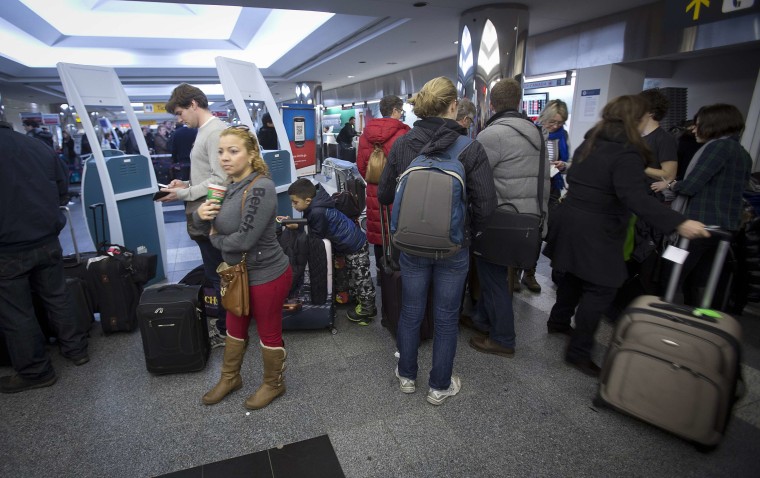Arctic temperatures are pressing on travelers in the United States, whether they're looking to move by plane, train or foot.
"It looks like today will be an improvement over yesterday," Daniel Baker, the CEO of FlightAware, said in an email Tuesday to CNBC. "Airlines canceled over 4,100 flights (Monday) in the U.S. and only 2,200 so far today. The Midwest continues to be most impacted, Chicago airports have over 30 percent of their flights canceled and Cleveland over 50 percent. Good news is only 160 flights canceled so far tomorrow."
The pain wasn't limited to the airlines. More than 500 people spent the night on Amtrak trains stuck in the snow in northern Illinois, rail line officials said Tuesday. Late in the day Monday, Amtrak issued service alerts warning it would provide reduced service in the Northeast Corridor and in the Chicago area through Tuesday.
"The airlines are operating at such capacity that any sort of hiccup has impacts for days," said Charlie Leocha, director of the non-profit Consumer Travel Alliance group.
Indeed, Southwest confirmed that's been a problem as they are still catching up from the last storm.
"We're just trying to get back on track and move forward," said Dan Landson, a spokesman for Southwest. The airline canceled 250 flights for Tuesday, mainly rippling out from the Midwest, where the low temperatures were extreme, Landson said. The ripples were expected to continue beyond Tuesday.
The severity of the storm even led JetBlue Airways on Monday to suspend all its flights at New York and Boston airports.
"JetBlue resumed departures from its major base of operations in New York and Boston this morning at 10 a.m. as planned," an airline spokesperson confirmed to CNBC on Tuesday.
In addition to the hassle, travelers often have to eat the cost of these delays.
"When it comes to the weather, there are no 'rights' for anybody," Leocha said. The airlines are required only to get passengers to their destination eventually, but any weather-related delay that requires a hotel stay falls to the traveler to absorb, he said.
Airlines will sometimes hand out hotel coupons that will get a "distressed passenger rate," but a flier will usually have to ask for it, Leocha advised.
For this storm, airlines have indeed been handing out both room vouchers and discounts, according to a front desk clerk at the Hilton Boston Logan Airport, where rooms were still available Tuesday.
"When air travel is impacted by the weather, and namely flights are delayed ... or canceled, then usually the airline will not extend any compensation or accommodations to the airline passengers," Brandon Macsata, executive director of the Association for Airline Passenger Rights, said in an email to CNBC. "AAPR certainly doesn't hold the airlines accountable for bad weather, but we certainly expect the airlines to provide a higher quality of customer care and service to the dislocated passengers."
Travel insurance can also help in situations like these, Leocha said. "The insurance companies actually have good help desks," he said. But in a cascading-storm situation like this one, sometimes you're just going to be stuck, no matter your connections.
"You really just need to be patient and figure out how you can minimize the damage from the delay," Leocha said.
Follow CNBC's Amy Langfield on Twitter at @AmyLangfield. Follow Road Warrior on Twitter at @CNBCtravel.
